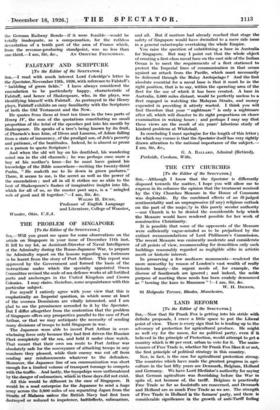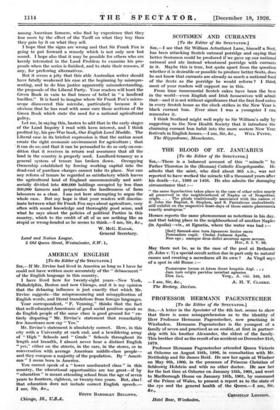LAND REFORM
[To the Editor of the SrzersTon.] Sm,—Now that Sir Frank Fox is getting into his stride with definite proposals, I crave a little space to put the Liberal point of view. There is every sign that he is leading up to the advocacy of protection for agricultural produce. He might as well cry for the moon, for no political party, even if it believed in the principle of Protection, would attempt to get a country which is 80 per cent. urban to vote for it. The main- tenance of Free Trade is, whether Sir Frank Fox likes it or not, the first principle of political strategy in this country.
Nor, in fact, is the case for agricultural protection strong. The countries which have made the greatest progress in agri- culture in the last fifty years are Denmark, Belgium, Holland and Germany. We have Lord Bledisloe's authority for saying that German agriculture was flourishing before the War in spite of, not because of, the tariff. Belgium is practically Free Trade so far as foodstuffs are concerned, and Denmark and Holland are as much Free Trade as we are. The strength of Free Trade in Holland is the farmers' party, and there is considerable significance in the growth of anti-Tariff feeling among American farmers, who find by experience that they lose more by the effect of the Tariff on what they buy than they gain by it on what they sell.
I hope that the signs are wrong and that Sir Frank Fox is going to put forward a remedy which is not only new but sound. I hope also that it may be possible for others who arc keenly interested in the Land Problem to examine his pro- posals when the series is finished, and to state their reasons, if any, for preferring alternatives.
But it seems a pity that this able Australian writer should have fatally weakened his case at the beginning by misrepre- senting, and to do him justice apparently misunderstanding, the proposals of the Liberal Party. Your readers will hunt the Green Book in vain to find traces of belief in " a landlord bacillus." It is hard to imagine where Sir Frank Fox's micro- scope discovered this microbe, particularly because it is obvious that he has read with some care those sections of the Green Book which state the need for a national agricultural policy.
Let me, in saying this, hasten to add that in the early stages of the Land Inquiry I read with keen interest, and I think profited by, his pre-War book, Our English Land Muddle. The Liberal case in its briefest expression is that the nation must create the right economic environment for agriculture ; that it can do so; and that it can be persuaded to do so only on con- dition that it receives in return real assurance that all the land in the country .is properly used. Landlord-tenancy as a general system of tenure has broken down. Occupying Ownership established by forcing working capital into the dead-end of purchase charges cannot take its place. Nor can any reform of tenure be regarded as satisfactory which leaves the agricultural land of • England uneconomically and anti- socially divided into 400,000 holdings occupied by less than 300,000 farmers and perpetuates the landlessness of farm labourers as a class. I am not here attempting to argue the whole case. But my hope is that your readers will discrim- inate between what Sir Frank Fox says about agriculture, very often with sound knowledge and thoroughly good sense, and what he says about the policies of political Parties in this country, which to the credit of all of us are nothing like as stupid or wrong-headed as he seems to think.—I am, Sir, &c., W. McG.
General Secretary.
Land and Nation League, 5 Old Queen Street, Westminster, S.W. 1.











































 Previous page
Previous page